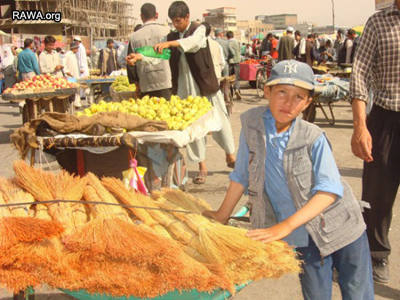
Drought, poverty and lack of food have adversely affected the life of many children in Chemtal and elsewhere, forcing some to work instead of going to school.
Eight-year-old Ahmad Shafi and his younger brother spend many hours a day fetching drinking water for their family in the drought-stricken Chemtal District of Balkh Province, northern Afghanistan. They have been unable to attend school as a result.
"We start around eight in the morning and finish by midday," Ahmad told IRIN, adding that their job was "difficult" and "long".
Ahmad's uncle, Abdul Samad - with whom his family has been living since his father died two years ago - sells vegetables at a local bazaar, and sometimes helps Ahmad and his brother when more than the usual volume of water is needed.
“I have to work and provide food or collect water… women cannot go far to collect water, so the boys have to do this job," he said.
Drought, poverty and lack of food have adversely affected the life of many children in Chemtal and elsewhere, forcing some to work instead of going to school.
It is hard to estimate the number of children who have abandoned school to collect water and/or help feed their families, but local officials have reported a considerable drop in school attendance.
"The number of students has gradually declined…10-20 percent of the several hundred students have abandoned school because of drought," said Enayatullah Sharaaf, head of Chemtal's education department.
"The quality of attendance has also been affected because students do not have enough time and energy to do homework," he said.
Mohammad Zahir Penhan, director of Balkh's education department, said most schools could be closed down in 2009 if the situation does not improve.
“Our children often go hungry”
Life in Chemtal is hard. Both agriculture and animal husbandry - prime sources of income - have been badly affected by drought.
"We hardly find any food to eat. Our children often go hungry," said a resident of Chemtal District, explaining that all his four children had lost weight and regularly fell ill.
"Their faces have become pale and they always complain about pain," he said.
Across the country thousands of livestock have perished over the past two years, and over 80 percent of rain-fed agricultural output had been lost this year owing to drought, the Ministry of Agriculture has said.
Broken promises? In June hundreds of drought-affected households from Alburz and Chemtal districts abandoned their homes and camped near Mazar-i-Sharif, the provincial capital of Balkh Province.
The government encouraged the displaced families to return to their original areas where they were promised that drinking water and food aid would be delivered.
Months later, people said the government had yet to fulfil its promises. "We have received no aid," said Abdul Naeem, a resident of Alburz District.
"If the government had trucked in water to us, we would not have had to trek for hours to collect a few buckets of water," said an elderly man, Mohammad Rasol.
Government officials in Mazar-i-Sharif said drinking water had been trucked in to people in Chemtal and Alburz districts for a while, but the process had stopped temporarily due to technical and financial problems.



